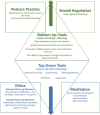Mind-Body Wellness: A Complement to Dental Education and Professional Development
- PMID: 35017866
- PMCID: PMC8691436
- DOI: 10.4103/ijoy.ijoy_7_21
Mind-Body Wellness: A Complement to Dental Education and Professional Development
Abstract
We strive in dental education to train our students to leave dental school with a skill set that enables them to be competent in diagnosis, treatment planning, and in their technical skills to treat their patients. We do not however train our students in practices to maintain their physical and mental well-being, cope with the demands of the dental school curriculum, and provide a toolbox of skills to manage the stresses of dentistry that will be with them for as long as they practice. The COVID-19 pandemic has added a new layer of stress on dental students and although the topic of wellness has been addressed in various ways in dental school environments, integrating a wellness component that supports our student's vulnerabilities while also teaching skills to build resilience to adversity is a needed and missing component in the dental curriculum. Elective stress management wellness courses have been implemented in dental schools and although this is a promising start, the demands of the dental school curriculum make it a difficult environment to become relaxed, grounded, and focused. Based on 6 years of experience in creating and implementing an integrated wellness program at an academic dental institution, this article aims to outline the benefits and applications for teaching mind-body practices in the dental school curriculum as preventative approaches to maintaining overall student wellness, for developing effective strategies to manage academic and clinical challenges and how it sets the foundation for the health, well-being, and professional mindset of future dentists.
Keywords: Dental education; dental student stress; mind-body wellness; stress and dentistry; yoga and meditation.
Copyright: © 2021 International Journal of Yoga.
Conflict of interest statement
There are no conflicts of interest.
Figures
Similar articles
-
Student and educator experiences of maternal-child simulation-based learning: a systematic review of qualitative evidence protocol.JBI Database System Rev Implement Rep. 2015 Jan;13(1):14-26. doi: 10.11124/jbisrir-2015-1694. JBI Database System Rev Implement Rep. 2015. PMID: 26447004
-
Evaluation of a Novel Wellness Curriculum on Medical Student Wellbeing and Engagement Demonstrates a Need for Student-Driven Wellness Programming.Teach Learn Med. 2023 Jan-Mar;35(1):52-64. doi: 10.1080/10401334.2021.2004415. Epub 2022 Feb 2. Teach Learn Med. 2023. PMID: 35107397
-
Embarking on a Journey of Discovery: Developing Transitional Skill Sets through a Scholarly Concentration Program.Teach Learn Med. 2019 Apr-May;31(2):195-206. doi: 10.1080/10401334.2018.1490184. Epub 2018 Sep 14. Teach Learn Med. 2019. PMID: 30216101
-
2013 SYR Accepted Poster Abstracts.Int J Yoga Therap. 2013;23 Suppl:32-53. Int J Yoga Therap. 2013. PMID: 24176784 Clinical Trial.
-
The influence of "new science" on dental education: current concepts, trends, and models for the future.J Dent Educ. 2007 Apr;71(4):450-62. J Dent Educ. 2007. PMID: 17468305 Review.
References
-
- Little JW. Complementary and alternative medicine: Impact on dentistry. Oral Surg Oral Med Oral Pathol Oral Radiol Endod. 2004;98:137–45. - PubMed
-
- Kraemer KM, Luberto CM, O’Bryan EM, Mysinger E, Cotton S. Mind-body skills training to improve distress tolerance in medical students: A pilot study. Teach Learn Med. 2016;28:219–28. - PubMed
LinkOut - more resources
Full Text Sources

